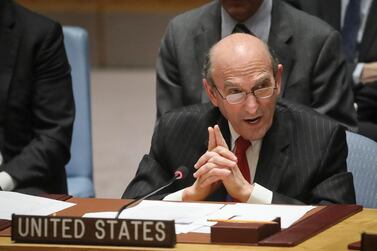Russia and China on Thursday vetoed a US resolution at the UN Security Council aimed at addressing the crisis in Venezuela, while a rival draft put forward by Moscow failed to win enough votes.
The failure to take action on the two competing drafts laid bare divisions among world powers over the way forward in Venezuela, which is mired in a political standoff and an economic meltdown.
The US text had called for new presidential elections in Venezuela and unimpeded deliveries of humanitarian aid. It won the required nine votes at the 15-member council, but Russia and China joined forces to block it.
Resolutions at the council, which are legally binding, must gain nine votes to be adopted, with no vetoes from the five permanent members - Britain, China, France, Russia and the United States.
France, Germany and Britain were among those that backed the US proposal. South Africa voted no while Indonesia, Equatorial Guinea and Ivory Coast abstained.
Russia's draft resolution - which urged a settlement "through peaceful means" and insisted that all humanitarian aid be agreed by President Nicolas Maduro's government - won only four votes: Russia, China, South Africa and Equatorial Guinea.
Seven countries including the United States, European countries and Peru opposed the Russian measure and there were four abstentions.
US envoy Elliott Abrams took an implicit swipe at Russia and China, saying some countries "continue to shield Maduro and his cronies and prolong the suffering of the Venezuelan people".
However he expressed satisfaction that "a clear majority of the council" had supported the US stance.
Russian Ambassador to the UN Vassily Nebenzia, however, said the US was staging an "illegal theatre of the absurd" by seeking to install opposition leader Juan Guaido as Venezuela's president.
Battered by economic collapse, Venezuela descended into a major political crisis when Mr Guaido declared himself interim president in January and asserted that Maduro was no longer a legitimate leader.
The US is leading a push for recognition of Mr Guaido, who heads the National Assembly. He is now backed by more than 50 countries.
A rival anti-US effort led by Mr Maduro's foreign minister and diplomats at the UN General Assembly – which has 193 members – has gained around 60 countries







